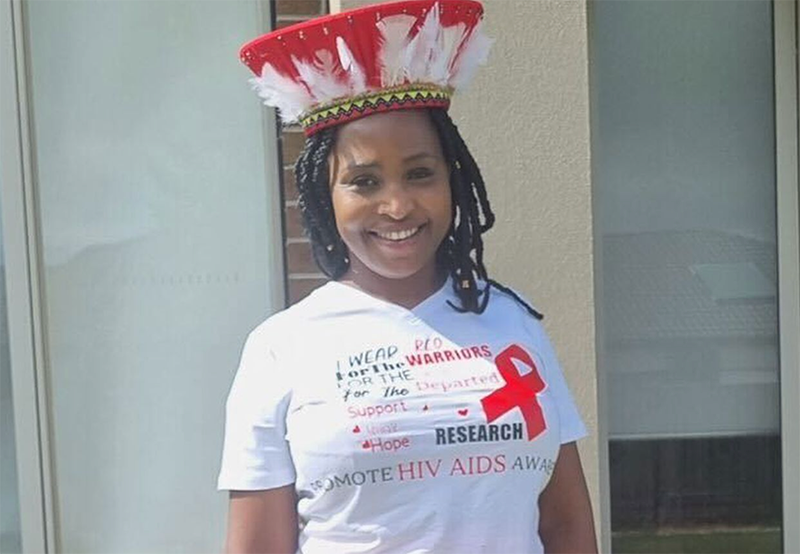- Diaspora
- No Comment
AUSTRALIA: Zim-born Chrissie has been living with an incurable virus for 23 years but most Aussies think women don’t get it

By nine.com
There’s an incurable virus affecting more than 3,300 Australian women, but millions mistakenly believe they’re not at risk.
Melbourne mum Christabel, who goes by Chrissie, is one of thousands living with human immunodeficiency virus (HIV) and thriving despite the stigma around it.
“I’m normal, just like any other person. I live a normal, healthy life. I’m a professional, I go to work every day. I’m a mother, I have a three year old daughter,” she tells 9honey.
But she went years without proper HIV education or effective treatment due to stigma and misinformation about the virus.
Chrissie was living in Zimbabwe when she tested positive for HIV in 2000, shortly after welcoming her first child.
“I had no idea what HIV was … only that in my country, people were dying of HIV and AIDS,” she says.
“There was a lack of knowledge, a lack of education around HIV. All they did was tell me, ‘You are HIV positive, you need to stop breastfeeding your child today’. That was it.”
Zimbabwe was in the grip of one of the world’s most severe HIV and AIDS epidemics at the time, but there was limited public education about the illnesses.
HIV weakens a person’s immune system and AIDS can happen as a result, but not all HIV diagnoses lead to AIDS. Chrissie didn’t know that at the time.
There was also a severe lack of effective HIV treatment options, so instead of HIV medication, the young mum was prescribed antibiotics.
“They said, ‘you have to take that every day, just so that you live longer’. There was no education,” Chrissie says.
“All I knew was that when you get diagnosed with HIV or AIDS, we get ready to die. We were waiting to get sick and die.”
That’s how she lived for nine years, until she moved to Australia in 2009 and marked that she was HIV positive on her visa application.
As soon as she arrived in Melbourne, Chrissie was connected with specialist local health services that finally offered her proper education and support.
For the first time, she had access to effective antiretroviral treatment which could reduce her viral load to an undetectable level, preventing transmission.
At first, she was hesitant to take it.
“At that time I had a lack of knowledge, because back home they used to say medication is what kills people,” Chrissie says. It was a common myth at the time.
“I got scared that if I start medication, I might die, so the specialist doctors took the opportunity to educate me.”
READ MORE: Something deadly was hiding in innocent photo of Ashleigh

Finally getting accurate information and effective treatment changed Chrissie’s life for the better from that day on.
Now she takes two Medicare subsidised pills a day to keep her viral load undetectable, her HIV is totally manageable and she’s using her story to educate and empower other women.
Undetectable equals Untransmittable (U=U) is a call to change the public perception of HIV and end HIV stigma, backed by more than 20 years of scientific evidence.
“All I knew was that when you get diagnosed with HIV or AIDS, we get ready to die.”
Too many Aussies mistakenly believe that only men who have sex with men are at risk of contracting HIV, putting women at risk of exposure via unprotected sex or delayed diagnosis.
More than half of all people living with HIV around the world are women and most of them struggle with stigma that affects their mental health, relationships, sex lives and careers.
“A lot of people don’t understand. A lot of people live in fear. A lot of people are isolated and hopeless due to fear,” Chrissie says.
“I’m educating others, I’m talking to friends, family, carers about HIV, and making them understand … to help reduce the stigma.”
She started an advocacy Facebook page, Stop HIV Stigma, to challenge the stigma and educate other women so they can protect themselves or seek effective treatment.
Chrissie has also just taken part in a moving short film and poetry collaboration called Thriving to help end HIV stigma.
Created by Australian artist Fleassy Malay in collaboration with seven women living with HIV and Positive Women Victoria, it shines a light on the experiences of Aussies like Chrissie.
The film was screened internationally to mark World AIDS Day on December 1 and Chrissie wants it to inspire global change.

“I have chosen to educate others, so I try to wear this brave mask and stand up and talk,” she says. “I do find it difficult sometimes but … I think this will help change people.”
She’s connected with other like minded women through Positive Women Victoria (PWV), a community based HIV organisation, and hopes their voices can help drown out the myths.
The organisation provides peer support, information and advocacy for women living with HIV and works to change the narrative around HIV in Australia.
“We shouldn’t feel ashamed. I know it’s a sensitive topic, but we should try to destigmatise the topic and normalise it, make people feel comfortable talking about it,” Chrissie says.
It’s only by sharing accurate information and amplifying the voices of Aussies like Chrissie that we can put an end to decades of HIV stigma and miseducation.
“People living with HIV, they live a normal life. HIV is not transmitted by talking to someone, or shaking hands, or sharing a cup,” Chrissie adds.
“I am a mother, I am a professional. I am a sister. We are thriving and HIV is manageable.”
It can be effectively treated, allowing people living with HIV to live healthy, productive lives with no risk of transmission for Aussies with an undetectable viral load.
